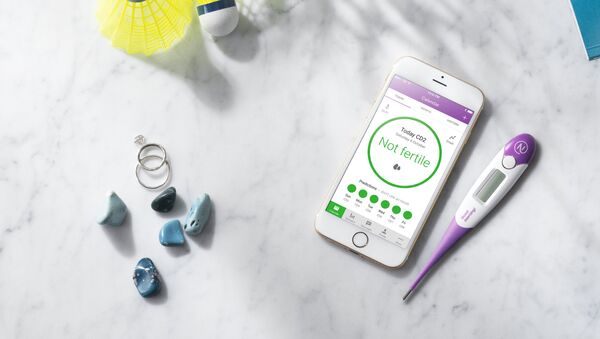While reliable data on its modern usage is unforthcoming, it's safe to say women counting the days in between periods and avoiding sex when they're most fertile is a fairly well-known family planning method.
Ova (female eggs) only live for about a day, meaning if someone has sex after one expires and before another is created, they will not get pregnant. However, if someone has sex before they ovulate, they can get pregnant, as sperm can stay alive in a uterus for around a week.
The idea has potentially existed for millennia — at least since 300 AD — although statistics suggest its reliability is among the lowest of the various contraceptive approaches in popular use, with around 24 out of 100 women who employ the approach ending up pregnant every year.
However, Swedish family planning app Natural Cycles could be the key to increasing the method's reliability to point it becomes "as good as the pill" at preventing pregnancy. The app, conceived by a family of particle physicists, considers an individual's ovulation window — ie how 'safe' unprotected sex would be that day — based on body temperature, menstruation and hormone levels via complex algorithms.
When a user starts using the app, they will receive about 40 percent of "green" days per month. Three months later, as the app becomes more familiar with a user's fertility, this will rise to 65 percent.
Despite the range of metrics the app considers, temperature is said to be most important — body temperatures typically fluctuate between 0.25°C to 0.45°C during and after ovulation, due to release of progesterone. The app comes with a physical thermometer, although algorithms are programed to eliminate "false positives" — for instance, temperature changes due to alcohol consumption, illnesses, stress, etc.
The firm has conducted three clinical studies of the app, and claimed it has a Pearl Index of seven, comparable to "the pill," which has a Pearl Index of nine.
Allegedly, a mere seven out of 100 became pregnant in a year of using Natural Cycles — and this figure included some who ignored the app's guidance and had sexual intercourse on a "red" day.
Some users are said to actively use the app to plan pregnancy, as well as avoid it.
Natural Cycles are said to be in the preliminary stages of approaching Western countries about receiving official certification, and entering partnerships to have the app endorsed and/or distributed via national health authorities. In many European countries, where birth control provisions are distributed to citizens without direct cost, the company may find a receptive audience — the city of Rotterdam, for instance, has called for mandatory birth control for parents deemed incapable of looking after their children.
However, the UK's National Health Service may be less enthusiastic. Despite condoms and contraceptive pills being distributed and/or prescribed for free on the NHS, the Service has publicly stated significant reservations about digital contraceptive solutions in general, and Natural Cycles in particular.
In a 2016 report, the NHS warned the company's clinical studies weren't rigorous enough, and relied on restrospective designs that did not collect sufficient data to support their positive conclusions — most of the individuals included in the study were aged 20 — 35, meaning the studies' findings may not be applicable to other age groups.
Would you trust a smartphone app as a contraceptive? https://t.co/ep1OXGOp73 #BehindTheHeadlines pic.twitter.com/q7PTSyLTZK
— NHS Choices (@NHSChoices) April 15, 2016
Moreover, the NHS was concerned about whether users would consistently use the app, or drop out entirely. Despite participants in the study having paid for the app, a third of users stopped using it at some point, a much higher drop-out rate than other habitual methods (eg. "the pill"). Reasons why users stopped using the app were not noted in the study.
"Participants in the study purchased membership and were obviously keen to try this method. Their usage may not be a true indication of the effectiveness of this type of app if it was available for free. A head-to-head randomised trial comparing such an app with established contraceptive methods would be required to establish how effective it is. However effective an application may be, it will not protect you against sexually transmitted infections, unlike the low-tech — but very reliable — condom," the report concluded.


